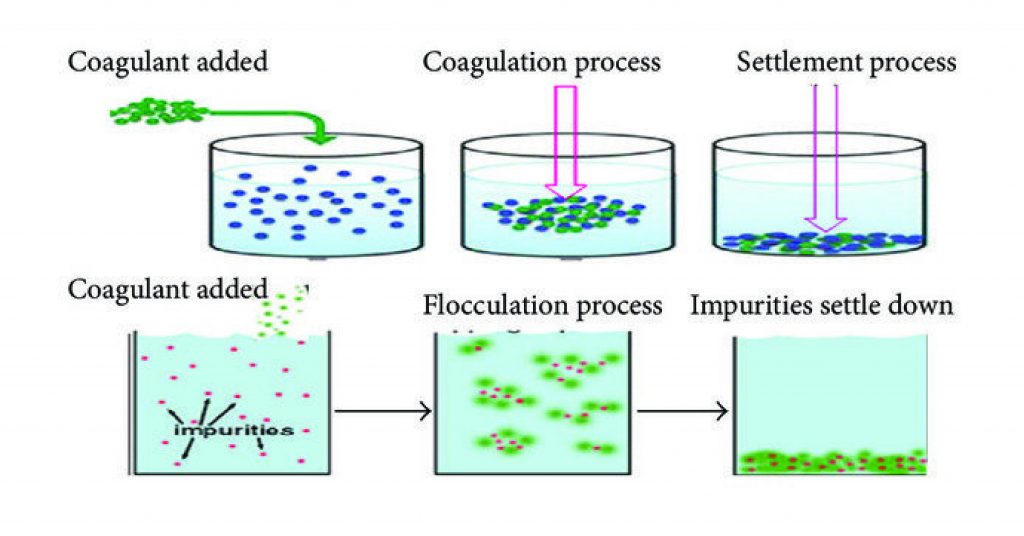Bangladesh faces a significant challenge when it comes to water pollution, with rapid urbanization, industrialization, and population growth contributing to the deterioration of water quality. Contaminated water poses serious health risks, leading to waterborne diseases and other related issues.
Among the many water treatment methods available, flocculation stands out as a vital process that helps improve water quality. In this article, we’ll delve into what flocculation is, how it works, its importance in Bangladesh, and how it differs from other methods like coagulation. We will also explore the latest innovations and the role of Ion Exchange in promoting flocculation-based solutions.
What is Flocculation?
So, what is flocculation? Simply put, flocculation is the process by which small particles in water aggregate or clump together to form larger particles, known as flocs. These flocs can then be easily removed from the water through sedimentation, filtration, or flotation processes. This is crucial because water often contains suspended particles, organic matter, and pollutants that are too small to be filtered out effectively without flocculation.
In Bangladesh, flocculation in water treatment is widely used in both wastewater treatment plants and drinking water purification systems. For example, rural communities that rely on surface water often face high levels of turbidity (cloudiness) due to suspended particles. Through flocculation, these particles can be efficiently removed, ensuring that the water meets health and safety standards.
What is the Difference Between Coagulation and Flocculation?
A common question that arises when discussing water treatment processes is, what is the difference between coagulation and flocculation? Though they are often mentioned together, coagulation and flocculation are distinct steps in the water treatment process, each playing a unique role in particle removal.
Coagulation is the first step, where chemicals called coagulants are added to the water to destabilize the particles suspended in it. However, coagulation alone does not form large enough aggregates to be easily removed.
This is where flocculation comes into play. After coagulation, the destabilized particles are stirred gently to encourage them to collide and bind together, forming larger flocs. The combined use of coagulation and flocculation in water treatment ensures that both small and large particles are efficiently removed from the water, making it cleaner and safer for use.
Benefits of Flocculation in Water Treatment for Bangladesh
Given Bangladesh’s diverse water challenges, the use of flocculation in water treatment brings several key benefits that directly impact public health, industry, and the environment.
- Improved Water Quality: Flocculation helps remove suspended particles, pathogens, and other contaminants from water, improving its clarity and safety for consumption.
- Cost-Effective: Flocculation is a relatively low-cost process compared to other water treatment methods.
- Versatility: Whether dealing with wastewater from industrial activities or purifying drinking water, flocculation in water treatment is highly versatile.
- Enhanced Environmental Protection: By removing pollutants from wastewater before it is released back into rivers and streams, flocculation helps reduce environmental contamination.
Innovations in Flocculation Technologies in Bangladesh
In recent years, advances in flocculation technologies have improved the efficiency and effectiveness of water treatment systems in Bangladesh. These innovations focus on enhancing the performance of flocculants, reducing chemical usage, and making the process more sustainable.
One such advancement is the use of natural flocculants derived from plants, which offer an eco-friendly alternative to synthetic chemicals. These bio-based flocculants are particularly beneficial in rural areas where access to traditional water treatment chemicals may be limited.
Additionally, automated flocculation systems are becoming more widespread in Bangladesh, allowing for more precise control of the water treatment process. These systems can monitor water quality in real-time and adjust the dosage of flocculants accordingly, ensuring optimal performance while minimizing waste.
Ion Exchange: Pioneering Cost-Effective and Sustainable Innovations in Bangladesh
Ion Exchange is Bangladesh’s leading company in water and environment management, recognized for its strong global presence and commitment to providing innovative solutions. They deliver customized, one-stop solutions across diverse industries, effectively addressing complex flocculation water treatment needs.
INDFLOC Solid-Liquid Separation Solutions
- INDFLOC Flocculants include synthetic anionic and cationic polymers designed for the primary treatment of sewage and industrial effluents, as well as sludge conditioning and clarification. These flocculants are also highly effective in treating effluents from mining, ceramic, and mineral processing industries, along with sugar clarification processes. It offers emulsions that enable faster flocculation with lower dosages, enhancing efficiency in wastewater and process water applications.
- INDFLOC Natural Flocculants are natural, biodegradable, and sustainable solutions tailored for various applications, such as the treatment of municipal and industrial wastewater, clarification of sugarcane juice, and effluent treatment in textiles and tanneries. These eco-friendly flocculants offer a sustainable approach to water treatment, ensuring minimal environmental impact while maintaining high efficiency.
By leveraging cutting-edge technology and innovative techniques, Ion Exchange ensures that its flocculation water treatment solutions meet the highest industry standards, providing significant value to its clients across multiple sectors.
Conclusion
In summary, what is flocculation? It is a crucial process in water treatment that helps aggregate and remove suspended particles from water, making it cleaner and safer for use. In Bangladesh, where water quality remains a significant concern, flocculation in water treatment plays an essential role in addressing these challenges. With the combined use of coagulation and flocculation and the latest innovations in flocculation technologies, Bangladesh is poised to improve the efficiency and sustainability of its water treatment processes.


